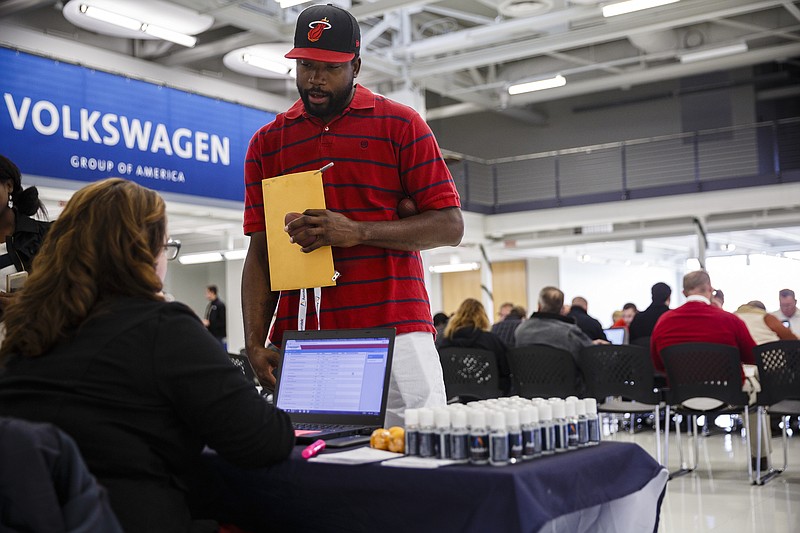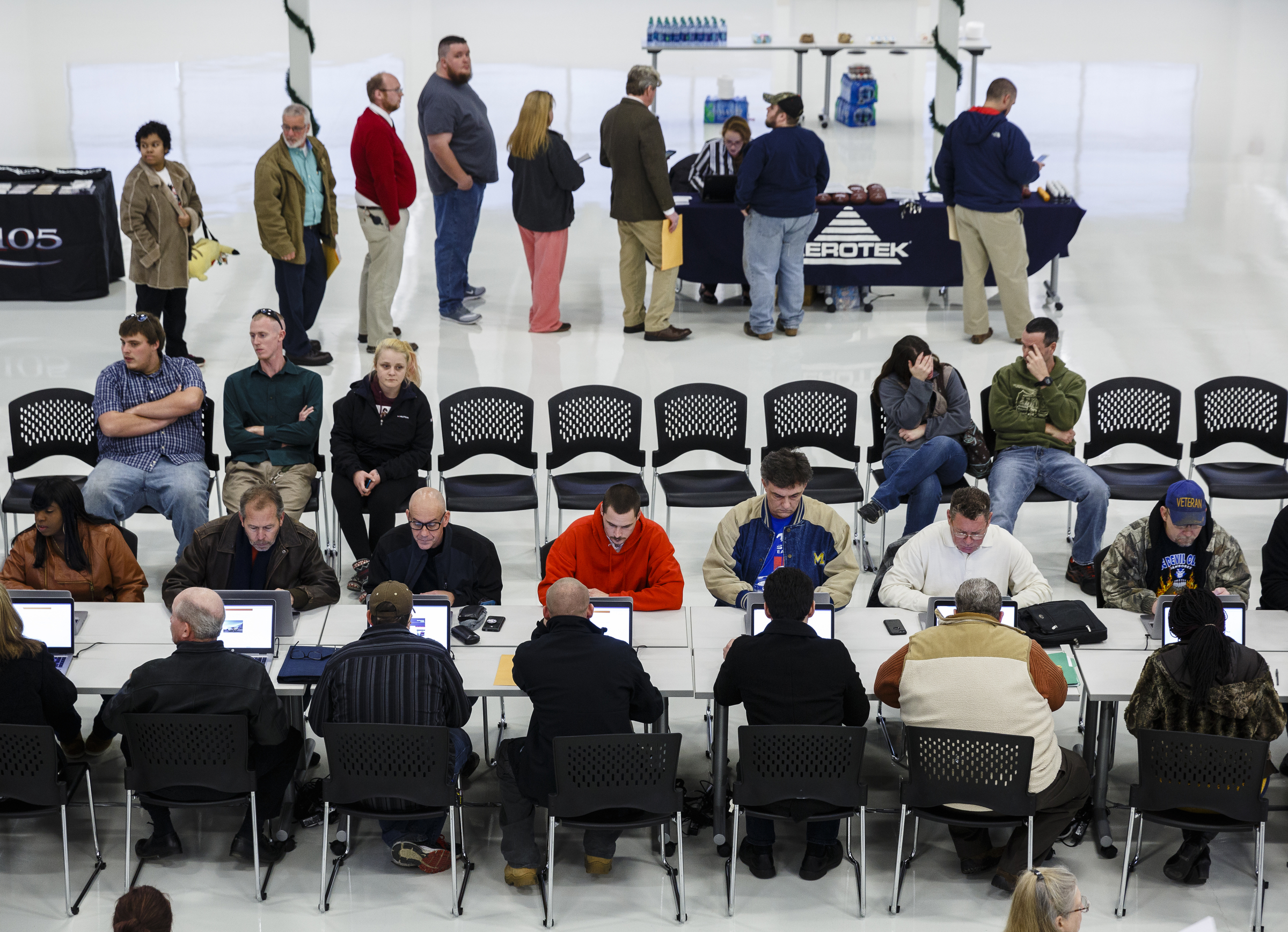At-home workers
* 3.7 million - Number of workers who work from home at least half the time* 2.8 - Percent of all workers who are now telecommuters* 50 - Percent of U.S. work that is capabitible with at least partial telework* $700 billion - Projected savings in travel, office, energy and other expenses, plus increased productivity, if all work that could be done by telecommute was done at workers’ homesSource: U.S. Bureau of Census, Global Workplace Analytics
Job market improves
Since the worst of the Great Recession in metropolitan Chattanooga:* The unemployment rate has declined from 10 percent in March 2009 to around 5 percent by the end of 2016* More than 18,000 net new jobs have been added since January 2010. In the past year, employment grew nearly 3.8 percent in Chattanooga, nearly twice the U.S. rate
When Aimee Cortese had her second baby nearly four years ago, she was eager to leave Los Angeles and return to her hometown and family in Austin, Texas. But she didn't want to give up her job with the Chattanooga-based Unum Group.
So like a growing number of workers, Cortese took her job home with her, moving to Texas three years ago where she continues to work as a senior employee relations consultant out of an office in her home.
"It's definitely been a blessing and a great experience for me to be closer to my family and to have the flexibility of working from my home," she says.
Cortese's daily commute to work involves only a few steps of walking into her office where Unum has hooked up its computer and a dedicated company phone line that allows for secured computer links and the ability to share computer screens and conduct video conferences. Cortese works with Unum managers across the country on telework arrangements and she says that 90 percent or more have worked out successfully.
"There are some jobs that can't be done at home, and if you are not self-motivated or get distracted easily at home it can sometimes be a problem," she says. "But in the overwhelming number of cases, work-at-home arrangements have been successful and lead to happier and more motivated workers."
Although less than 3 percent of all Chattanoogans work from home, the share is growing as jobs shift from brawn to brain and internet links add more broadband speed and reliability. Businesses also are offering more work-at-home options for their employees to recruit or keep workers as unemployment falls and employers try to fill job openings.
At BlueCross BlueShield of Tennessee, Chattanooga's biggest private employer, one of every four workers - or 1,648 of the company's nearly 6,000 employees - is a telecommuter working primarily from home.
"It's a good recruiting tool and retention model to give people the option to work at home which allows them to live most anywhere. People really enjoy that," says Mary Danielson, communications manager for the Chattanooga-based BlueCross.
Cigna Healthcare has more than a third of its Chattanooga staff working out of their home. The Chattanooga service center employs 530 work-at-home employees and 800 office workers.
"Work-at-home not only offers significant cost savings by having a smaller real estate "foot print," it provides our employees with greater work hour flexibility, which is critical to our (around-the-clock) service model," says Thomas Philbotte, senior director of Cigna's Chattanooga Service Operations Center.
Unum has boosted the share of its Chattanooga employees who work from home by 40 percent over the past couple of years, although only about 7 percent of the 2,800 local Unum employees are full-time teleworkers.
Holly Haynes, assistant vice president of employee relations, said those working at home save on commute days and often are more focused than those who work in an office with other workers.
"When the arrangement is set up correctly, there are fewer distractions and it's easier to stay focused," she says. "I encourage my team to take work-at-home days when they need to get a special project done or meet a pressing deadline."
Employers say video conferencing often helps engage workers more than just telephone calls, but working at home alone can feel isolated for some workers.
"It can be harder to be visible, but it's not impossible," Haynes says. "Remember the saying "out of sight out of mind?" This can be true, so it's important for at-home workers to proactively seek out opportunities and take ownership of their development."
The number of workers doing their jobs from their own homes continues to grow - and studies suggest it could go far higher if broadband connections were improved in rural areas and more employers would adapt to the new work arrangement. A survey by Connected Tennessee, an advocacy group for broadband Internet services, said surveys show 79 percent of Tennesseans want to work at home, if given the opportunity.
Global Workplace Analytics, which analyzes at-home work trends, said about half of all jobs are telework-compatible, at least some of the time. If all such work was done at home, businesses could save an estimated $500 billion in real estate, energy and absenteeism - or about $11,000 a year per employee - while workers could collectively save another $200 billion - or anywhere from $2,000 and $7,000 per worker every year - in transportation and work-related costs.
But telework is certainly not for all jobs. Manufacturing, hospitality and hospital jobs, for instance, usually require workers to be on the job at a particular work site. With employment at an all-time high in the Chattanooga area, employers are having to dive deeper into Chattanooga's labor pool to fill such jobs.
"With lower unemployment, it's a very competitive market right now," says Lindsay Hunter, manager of operations for HTI Employment Solutions. "But we are still getting a lot of quality applicants, especially for jobs that are seen as more stable or those that generally pay better."
Even without any work-at-home option, December job fairs for jobs at Volkswagen, McKee Foods and other manufacturers continued to draw a lot of applicants looking for work, even with some of the lowest jobless rates in the area in a decade. More than 800 persons attended a recent job fair for McKee Foods and a Volkswagen job fair conducted by Aerotek Staffing also drew hundreds of applicants in person and online shortly before Christmas.
But Melanie Sailes, 38-year-old Burger King employee, said finding better paying jobs is still hard in Chattanooga.
"The unemployment rate may be down, but it's still hard to get a good-paying job," Sailes said during a recent job fair for McKee Foods in Collegedale. "It's still a challenge for many of us."

